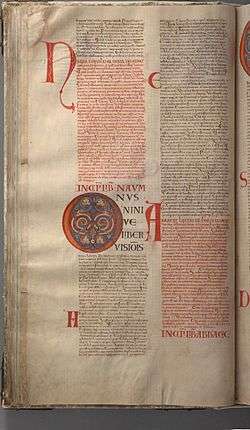Nahum 3
| Nahum 3 | |
|---|---|
|
| |
| Book | Book of Nahum |
| Bible part | Old Testament |
| Order in the Bible part | 34 |
| Category | Nevi'im |
Nahum 3 is the third and last chapter of the Book of Nahum in the Hebrew Bible or the Old Testament of the Christian Bible.[1][2] This book contains the prophecies spoken by the prophet Nahum, and is a part of the Book of the Twelve Minor Prophets.[3][4] This chapter describes the cause of the destruction of Nineveh.[5]
Text
- The original text is written in Hebrew.
- This chapter is divided into 19 verses.
Textual versions
Some most ancient manuscripts containing this chapter in Hebrew language:
- Masoretic Text (10th century)
- Dead Sea Scrolls: (2nd century BC)[6][7]
- 4QpNah, known as the "Nahum Commentary" (1st century BC)[8]
- 4Q82 (4QXIIg): extant: verses 1‑3, 17[6][9]
- Wadi Murabba'at (MurXII): extant: verses 1‑19[6]
Ancient translations in Koine Greek:
- Septuagint (3rd century BC)
- Dead Sea Scrolls: (2nd century BC)[6]
- Naḥal Ḥever (8ḤevXIIgr): extant: verses 3, 6‑17[6]
- Theodotion version (~AD 180)
Simplified plan of ancient Nineveh, showing city wall and location of gateways.
Structure
NKJV groups this chapter:
- Nahum 3:1-7 = IV. The Cause of the Destruction: The woe of Niniveh
- Nahum 3:8-15 = Comparison to other lands
- Nahum 3:16-19 = The final judgment
Verse 8
- Are you better than No Amon
- That was situated by the River,
- That had the waters around her,
- Whose rampart was the sea,
- Whose wall was the sea?[10]
- "No Amon" is translated from Hebrew word: נא אמון nō-’ā-mō-wn,[11] (Jeremiah 46:25; Ezekiel 30:15-16) that is ancient Thebes,[12] referring to the Egyptian name Niwt-Imn, the "City of Amun" that was used for the city from the end of the New Kingdom period. The well-fortified Thebes in Egypt fell to Ashurbanipal in 661 BC, and here is used as a "solemn warning to proud Niniveh" that would fall despite its excellent defenses (vv. 14-19.).[5]
- "River" refers the Nile and the surrounding canals.[13]
Verse 9
- Ethiopia and Egypt were her strength,
- And it was boundless;
- Put and Lubim were your helpers.[14]
- Ethiopia in the Hebrew text is כוש Cush[15]
- "Put" and "Lubim" is identified as Libyans (2 Chronicles 12:3; 2 Chronicles 16:8; Jeremiah 46:9; Ezekiel 30:5; Ezekiel 38:5; Daniel 11:43).[5]
Verse 19
- Your injury has no healing,
- Your wound is severe.
- All who hear news of you
- Will clap their hands over you,
- For upon whom has not your wickedness passed continually?[16]
The message in this final verse of the Book of Nahum gives a positive encouragement and "message of comfort for Israel, Judah, and others who had experienced the "endless cruelty" ("wickedness passed continually") of the Assyrians."[17]
See also
- Ashurbanipal
- Thebes
- Other related Bible parts: Nahum 1, Hebrews 10, Revelation 18
References
- ↑ Collins 2014.
- ↑ Hayes 2015.
- ↑ Metzger, Bruce M., et al. The Oxford Companion to the Bible. New York: Oxford University Press, 1993.
- ↑ Keck, Leander E. 1996. The New Interpreter's Bible: Volume: VII. Nashville: Abingdon.
- 1 2 3 The Scofield Study Bible, Oxford University Press. 2003. ISBN 9780195278583. pp. 1185-7.
- 1 2 3 4 5 Dead sea scrolls - Nahum
- ↑ Timothy A. J. Jull; Douglas J. Donahue; Magen Broshi; Emanuel Tov (1995). "Radiocarbon Dating of Scrolls and Linen Fragments from the Judean Desert". Radiocarbon. 38 (1): 14. Retrieved 26 November 2014.
- ↑ VanderKam, James C., The Dead Sea Scrolls Today, Grand Rapids: Eerdmans, 1994. pp. 10-11.
- ↑ Ulrich & 2010 617.
- ↑ Nahum 3:8
- ↑ Hebrew word #528 in Strong's Concordance
- ↑ Targum and Vulgate read populous Alexandria. New King James Version
- ↑ New King James Version
- ↑ Nahum 3:9
- ↑ Hebrew word #3568 in Strong's Concordance
- ↑ Nahum 3:19
- ↑ Michael D. Coogan, A Brief Introduction to the Old Testament, (Oxford: Oxford University Press, 2009) 297–298.
Bibliography
- Ulrich, Eugene, ed. (2010). The Biblical Qumran Scrolls: Transcriptions and Textual Variants. Brill.
External links
| Wikisource has original text related to this article: |
| Look up Nahum in Wiktionary, the free dictionary. |
- Unique Pictures Of Nahum Tomb By Kobi Arami
- Jewish translations:
- Nachum – Nahum (Judaica Press) translation [with Rashi's commentary] at Chabad.org
- Christian translations:
- Online Bible at GospelHall.org (ESV, KJV, Darby, American Standard Version, Bible in Basic English)
- BibleGateway
- Nahum – King James Version
-
 Nahum public domain audiobook at LibriVox Various versions
Nahum public domain audiobook at LibriVox Various versions
This article is issued from
Wikipedia.
The text is licensed under Creative Commons - Attribution - Sharealike.
Additional terms may apply for the media files.
